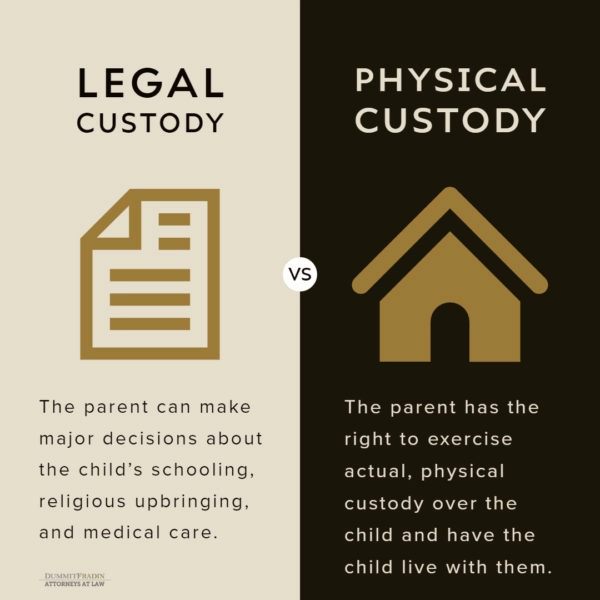Understanding Child Custody in North Carolina: Key Factors and Considerations
When it comes to determining child custody in NC, there are many factors to consider and decisions to be made. The child custody process in North Carolina can often be a confusing one for parents, as statutory law does not define well all the many facets of custody.
Legal Custody vs. Physical Custody
In a custody matter, parents are given some type of “legal custody” and “physical custody” over the minor child or children. Legal custody and physical custody in the technical sense describe two different aspects of custodial rights that the parents might share. Or, it could be granted to only one of the parents through a custody agreement or a custody court order.
Physical custody means that a parent has the right to exercise actual, physical custody over the child and have the child live with them. Some states will award joint physical custody when the child spends significant amounts of time with both parents.
Legal custody of a child means having the right and the obligation to make decisions about a child’s upbringing. A parent with legal custody can make major decisions about the child’s schooling, religious upbringing, and medical care.
Did you know that in North Carolina, judges normally start by assuming a 50/50 child custody split? But don’t worry, this video explains what that means and how an attorney can help you fight for more time with your children. It also dives into the difference between joint custody and full custody (and why full custody is rare).
Child Custody in NC is Focused on the Child’s Best Interests
In North Carolina, Courts will determine custody based on what is in the “best interests of the child.”
The best interests standard can be hard to define in many situations. Yet, some of the most common factors considered in this analysis by the Courts are:
- The wishes of the child (depending on the child’s age and maturity)
- Mental and physical health of the parents
- The specific or special needs of the child
- Religious or cultural considerations
- The need for a continuous, stable environment
- The ability of each parent to provide for the child, etc.
It is important to remember that the child’s best interest is determined by considering many factors related to the child’s circumstances, the parent or caregiver’s circumstances and their capacity to parent. Above all, the child’s ultimate safety and happiness is the paramount concern.
Joint Custody
In North Carolina, it is becoming more and more common for parents to get joint physical and legal custody of a child. With joint custody, each parent has equal physical custody time with the child and equal decision-making authority for major decisions affecting the child’s life. Additionally, there has been a recent trend among North Carolina Courts, toward ordering a “week-on-week-off” custody schedule for parents who are to share joint physical custody. In other words, the child or children will spend one week at one parent’s house and one week at the other parent’s house.
Nowadays, most courts prefer to order joint custody. Yet, sometimes it is in the best interest of the child that one parent is granted primary custody of the child. When one parent has primary custody of a child, the other parent usually gets visitation privileges. Except in extraordinary circumstances, it is healthy and often encouraged for the child to have regular contact with the non-custodial parent.
Child Custody Consent Order
Not all custody determinations need to be made in the courtroom by a judge. A Child Custody Consent Order may be entered into by the parties outside of court instead. A consent order is essentially an agreement between the parents, i.e., without a trial. In this consent order, they state what type of custody each parent will exercise. The parties can address the type of schedule that will be followed on a day-to-day basis, as well as the schedule that will be observed on holidays and special occasions.
Even if a lawsuit has already been filed, the two parties may come together to agree and subsequently ask the court to approve their agreement. The agreement almost always will be approved and thus become a binding agreement that can be enforced by the court. The form of the custody determination — strictly agreement or order — may make some difference. Each is enforced differently and treated differently if a change in custody or visitation needs to be made in the future.
Have More Questions About Child Custody in NC?
Child custody is an important and often emotional process when going through a divorce. If you or a loved one is caught in an ugly custody battle or just need some advice, call Dummit Fradin to speak with someone on our dedicated family law team in Winston-Salem. They are ready to answer your questions and fight for the best possible outcome.
Call us today to schedule a consultation with an experienced attorney and start building a brighter future for your family.
Call now!
336-962-7221


